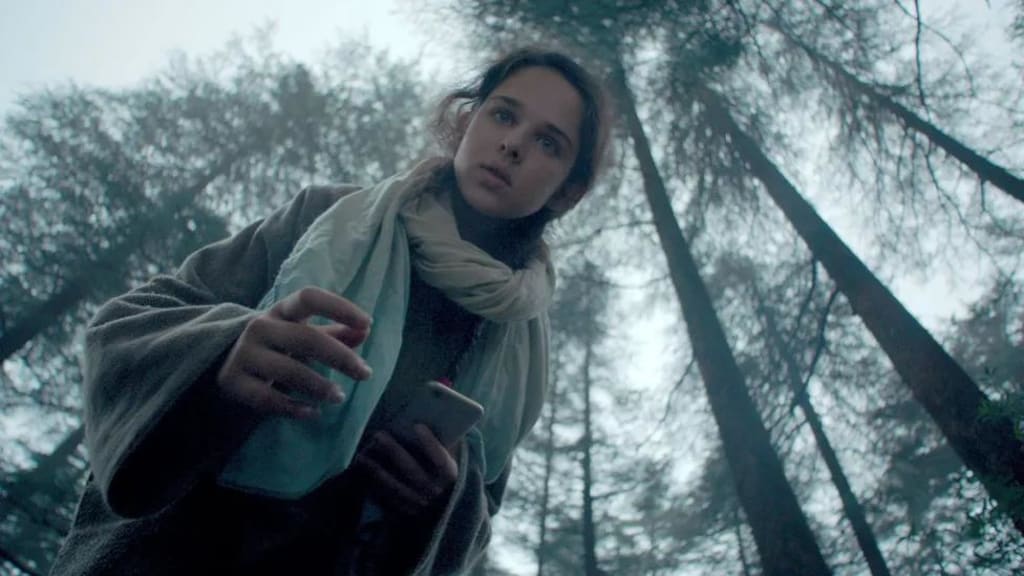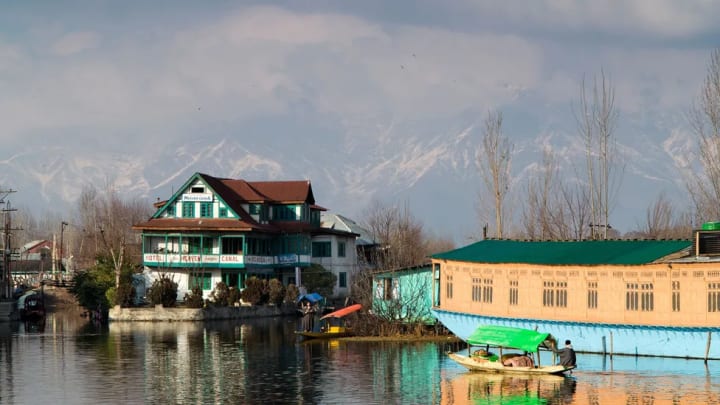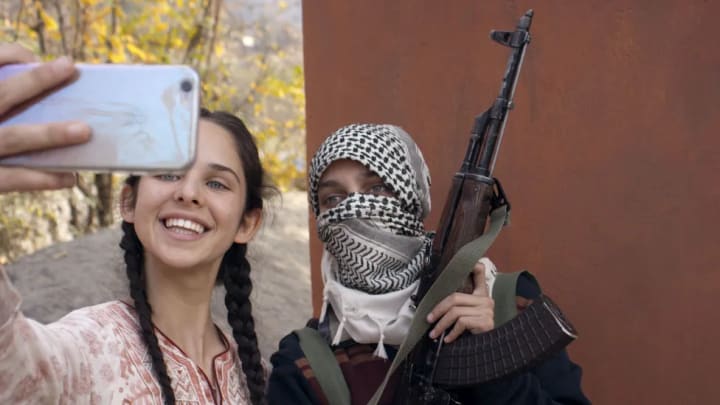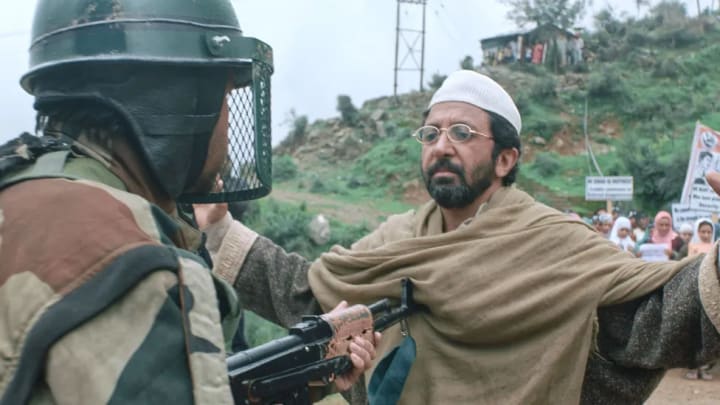
In 2014, when Ashvin Kumar began making No Fathers In Kashmir, a feature film set in the disputed region of Kashmir, the director knew it would be fraught – but he didn’t expect a nine-month battle and censorship row to clear it for ‘public exhibition’ (cinema release) in India. Kumar had to heavily edit four scenes so that India’s Central Board of Film Certification would issue the film with a Universal Adult certificate (equivalent to PG) in April 2019. This week, the uncut version of No Fathers In Kashmir opens in UK cinemas, before being available for international audiences to view online in a couple of months.
The Indian director, who received an Academy Award nomination for his 2004 short film Little Terrorist, remains hugely frustrated with the protracted struggle and feels it was politically motivated. “A process that should have taken two to three weeks took nine months; the board went at the film with a machete; a piece of expression has been mutilated and vandalised in a process that was less about certification and more about showing us our place,” he says. (The board didn't respond to our request for a comment.)
The film is politically sensitive because Kashmir is a disputed territory, claimed by India and Pakistan, with the nuclear-armed neighbours fighting three wars over it (in 1947, 1965 and 1999) and nearly starting a fourth in February 2019. For three decades, Kashmir has been devastated by a bloody conflict between Indian forces and an armed insurgency, with conservative estimates putting the death toll at around 40,000 since 1989.
Story continues below

Current events and recent history characterises Kashmir as a place of turmoil, but it wasn’t so long ago that the breathtakingly beautiful Himalayan region was known as ‘heaven on Earth’ thanks to its snowcapped peaks, magnificent valleys, Alpine-esque forests, crystal-clear lakes, glistening glaciers and renowned Kashmiri warmth and hospitality. Kashmir was on the hippie-travel trail – Ravi Shankar taught George Harrison to play the sitar on a houseboat on Dal Lake, Srinagar – and its idyllic scenery was as much a star of Bollywood films as the leading actors of the day, thanks to its reputation as the ‘Switzerland of India’.
My mum has happy memories of going to university in Kashmir’s capital of Srinagar in the late 1960s, crossing Dal Lake by boat on her daily commute to campus, visiting Char Chinar, a small island in the middle of the lake that’s home to four striking Chinar trees, and hiking and sledging at the Pahalgam hill station. Tragically, that couldn’t be further removed from the place numbed and traumatised by oppression and insurgency in Kumar’s poignant film. No Fathers in Kashmir is the story of a teenager, Noor (Zara Webb), who is dragged from Birmingham in the UK to Kashmir to see her grandparents, and meets local lad Majid (Shivam Raina).
Noor and Majid’s blossoming romance intensifies when they learn their missing abus (fathers) were best friends and are among the thousands of Kahsmiri men who have disappeared after being picked up by the army. Noor seeks answers and discovers that the valley’s forests hide mass graves, and in a chilling scene is told dogs have developed a taste for human flesh through raiding the shallow graves – “the dogs of Kashmir, not like normal dogs”.
By telling a naive story of innocent teenagers and first love, the idea was to take people back to that time in their lives when geopolitics is alien to you – but in Kashmir, politics creeps in – Ashvin Kumar
Little Terrorist and Kumar’s National Award-winning documentaries Inshallah, Football (2010) and Inshallah, Kashmir (2012) share similar themes with No Fathers in Kashmir. He chose to tell this story through teenagers in order to make it relatable and to speak to young India. “By telling a naive story of innocent teenagers and first love, the idea was to take people back to that time in their lives when geopolitics is alien to you – but in Kashmir, politics creeps into the personal lives of these kids,” he says. “I balanced that with the metaphors of disappeared fathers, mass graves, and wives and mothers who are waiting for news of what’s happened to their disappeared husbands and sons.
“I wanted to appeal to young Indians because they’re born in the 1990s, after economic liberalisation gave them choice, opportunity and the chance to shape their destiny. For young people in Kashmir, choice and opportunity do not exist, they are born into war and conflict, and their cries against oppression and for self-determination are not heard.”

In India, the film has been acclaimed for thoughtfully and sensitively shining a light on ordinary day-to-day life in an extraordinary place, being a teenager in one of the most heavily militarised places on the planet (India has an estimated 500,000 soldiers in the state of Jammu and Kashmir). Academy Award-nominated and Bafta award-winning director Mira Nair (Monsoon Wedding) said: “It’s a very brave film and it’s a timely film. It’s also a moving film and it’s beautifully performed and skilfully made. I think it’s also poignant to see war through the eyes of the children.”
Nuanced art and culture focusing on the human tragedy in Kashmir is in short supply. The devastating independent film Haider (2014), an adaptation of Hamlet, and Hamid (2018) are notable exceptions, along with searing graphic novel Munnu (2015) by Kashmiri illustrator and newspaper cartoonist Malik Sajad.

Kumar hopes that No Fathers in Kashmir will help people move beyond dehumanising stereotypes, and trigger discussion about – and empathy for – the cost of a conflict that shows little sign of resolution. “For Kashmiris, the average Indian is a soldier in jack boots and camouflage and carrying a gun, and for Indians the average Kashmiri is a kid throwing stones at the army – these are the caricatures that have been propagated for the last 30 years. I hope that as the film is seen by UK and international audiences it will stimulate support, debate, curiosity, awareness, and compassion for the situation that Kashmiris find themselves in.”
Waiting for change
In August 2019, the situation in Kashmir evolved dramatically, with India revoking the region’s special status, placing Jammu and Kashmir under direct rule, and imposing a communications ban and media blackout, as well as deploying tens of thousands more troops. According to Human Rights Watch, thousands of Kashmiris, including political leaders, activists, journalists, lawyers, and protesters, have been detained.
The impact on day-to-day life has been severe. “For five months schoolchildren have not been able to go to school, so students have missed important exams, electricity has been switched off, Kashmiri students studying in other parts of India have not been able to access course fees or medical fees,” says Kumar. “All government services are online, whether applying to college, for a driving licence, pension or medical card – 7.5 million Kashmiris have not been able to do anything.”
Last week the internet ban was partially lifted but a social media ban remains in place – the longest suspension of internet services by any democracy in history. More than five years after Kumar began making this film on the suffering in Kashmir, it’s more relevant than ever. “It’s been a tough trek, we’ve been making this film for five years. and we’ve had issue after issue, but the fact that we’re here is a miracle,” he says. “The film is about waiting: wives, mothers and daughters who are waiting for information on their loved ones – husbands, sons and fathers who have disappeared. What we’ve been through isn’t anything that Kashmiris have had to endure.”
About the Creator
Monu Ella
And I know it's long gone and there was nothing else I could do






Comments
There are no comments for this story
Be the first to respond and start the conversation.